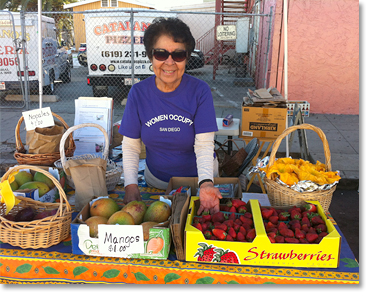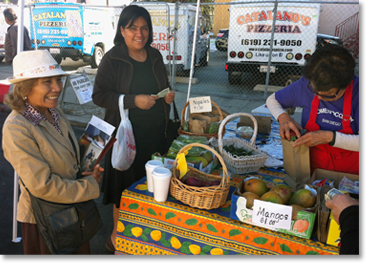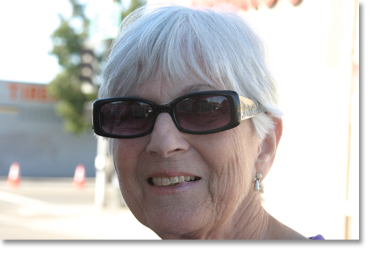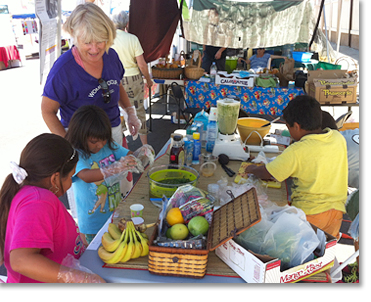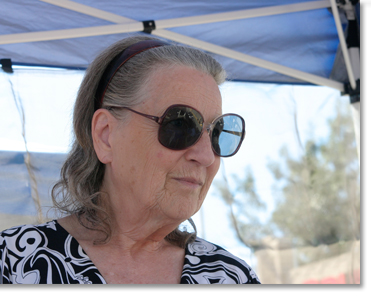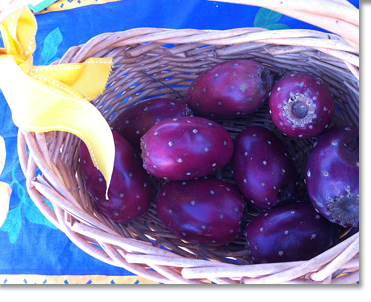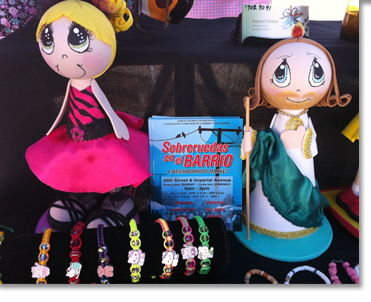|
Community Helps Community
Selling Fruits And Vegetables at the Sobreruedas Interview with Four Members of Women Occupy San Diego San Diego, California |
||||||||||||||||||||||||||||||
Virginia Franco: Then, as today, some say, I too benefited as a low wage worker and single parent with three children. Services then, named Food Banks, operated out of churches and other public buildings. This alternative method of grocery shopping enabled many families to have modest purchasing power; at the same time keeping nutrition vital in the homes. I hope we are serving a function here; at the same time, we appreciate the sense of community, ever so evident here. In Motion Magazine: I've noticed that the nopales are selling well. Why do you think they are so popular? Virginia Franco: The nopales are a favorite item of people living south of the border, in Mexico, Central, and South America - in the desert populated regions. These items grew to become more of a staple over time; as far as I know, a delicacy all around the continent - except the U.S. My family came from the state of Chihuahua, Mexico. I grew up in Camarillo, California eating nopales and tunas (prickly pears) as a kid - right off the bushes - in my then little town in Ventura County. My favorite recipe was scrambled eggs with nopales. Grandma raised chickens, and there we were, having a nutritious meal from the backyard. "Brain food" as Grandma was quick to mention. And now though, as most of us who own televisions know, we have more health problems from eating too many "take-out foods" -- they are high on calories with less nutrition. So yes, we sell cactus products at Sobreruedas. In Motion Magazine: Do you think it's significant that you, as a women's group, are involved with food? Virginia Franco: Yes, and I have an example -- me. As with other women, I shared in an era before, the 1980's, when I experienced hard times. During that difficult era of Reagnomics, economic "deregulation" caused national havoc: controlling the money supply, benefiting the privileged. Much like today, there was a reduction of government spending which would have helped benefit those most in need. Today, a sort of 'Reaganomics Revival' is said to exist. Anyway, those years were especially difficult for single parents - mostly women. Many, like me were likely raising more than one child - me, three. In that period I worked three jobs. They were as a week-end home-care giver to mentally-ill adult patients released from Atascadero Prison, originally meant to be for the criminally insane (such a travesty of justice); as a Kelly Girl Services part-timer; and, also I had a clerk job at college while finishing my degree in education. Much later, I earned an MA in education. After twenty years plus on full-time salary, including years as a substitute teacher, I retired. I don't need to go on about the high degree of women who find themselves alone raising their kids once a divorce happens. Most owners of television sets know widely what's known on that subject. I don't know what would have happened to me and my family if services like those Food Banks of old, today's Farmers' Markets, and here, Sobreruedas, and other not-for-profit services had not existed. Thank you for wanting to share my opinion of the positive ambience Sobreruedas brings to the community here in Barrio Logan. Tammy Martin: "Learning how to grow" In Motion Magazine: Someone was just saying that part of the food comes from people's gardens. You, I believe, grow vegetables in your garden, and there's some Japanese cucumbers here today. How do you see that process? Tammy Martin: I think it relates to a whole lot of things environmentally, because now it is not having to be shipped. I'm growing it myself. I know what is going into it. I know that I am not adding chemicals. I know that it is healthy for my community. We are growing for ourselves but we are also growing to help others. In Motion Magazine: Do you think that it is a coincidence that this is a women's group that is involved in this? Do you think that is important? Tammy Martin: I think that what is being done is very important. In the last few years, what I've seen is the women stepping up and it really makes me sad … everybody should be stepping up and doing their part. I've talked to a lot of friends and I have friends, young ones, who are just learning how to grow, but they are doing it in pots because they don't have land. There are so many things that can be grown in pots. Every little thing that you do in your house saves you money, but it also is saving costs as far as emissions or having it shipped to you. You are keeping the money in your own community. Those dollars are staying local. It adds to community. We are taking care of each other. In Motion Magazine: What do you think about the Sobreruedas? Tammy Martin:I think it is a fantastic idea. I'm hoping that it grows and that more and more people come out here, taking the time to come out here and have something for the community that is supported by the rest of the community. I'm hoping that they come out here in bigger numbers.) Evie Kosower: "Straight onto the table" In Motion Magazine: What are you doing here today? Evie Kosower: I'm with the Women Occupy San Diego group that is selling fresh fruits and vegetables. Many of them have been donated. Some we buy at a wholesale store to make these kinds of food available in this community, which is basically Barrio Logan. They had set up this street fair but there was no food included in that. We had to look into doing something about the food issue in the city and make it more available to people in areas where it may not be, so, we set up a booth as part of the street fair. This is our fourth time getting to be part of the community that is working in the street fair. We are the only food booth at the moment, other than ones that prepare food that people eat here. It has been an interesting experiment. We are asking that people who do come to shop what things they want us to have that we don't have and see how we can make that available. It varies what we do have each time, because it depends on what is in season and what we can get for a good price to be able to sell it for very, very low prices to the people. In Motion Magazine: Why do you think Women Occupy decided this was an important thing to do? Evie Kosower: Well, we've been looking for what we feel are the major issues in the city, given the economy and the lack of change in the economy. Food access is one of the major issues that some of us came up with. We are a subcommittee that has been working on the food access issue. In Motion Magazine: You are saying that you have become part of the community that is putting the Sobreruedas together. How has that been going? Evie Kosower: It is interesting because what we do is when there is enough of us here, we take turns going up and down the marketplace, which is only about two blocks long, and visit the stands and talk to the people. We have actually gotten some t-shirts printed for us by one of the young people who has set up a stand for his own little business. And we are talking to someone else about some of their goods. We are making ourselves part of the group. In Motion Magazine: Oftentimes people make a particular connection between women and food sovereignty. Do you think it is a coincidence that Women Occupy has become involved in this? Evie Kosower: It is probably not a coincidence that we have that interest, certainly because women and food go together. We are usually the ones that do the preparing and the shopping and that sort of thing. But I think that part of the issue is that in the Farmers' Markets around town, the men that come from local farms, or not so local but still California farms, that go to those markets, they are so busy because there are so many Farmers' Markets around San Diego that they could not come. They actually were asked to. So, we are filling a need in an area where they weren't able to get the produce that people wanted from other farmers. There may be other booths that open up here. It will be interesting to see. In Motion Magazine: Have you been involved in picking up any of the food that comes from other people's gardens? Evie Kosower: Actually I went to the one in my own community, which is not far from here, City Heights, to talk to them about when they had food left over from the ROOTS garden and other gardens locally there, their Saturday markets. If they hadn't sold them all, would they sell them to me at half price so that we could take them here. We had something worked out but it was primarily greens and we found that those greens didn't sell here. I'm not sure if it was just that one experiment or just that this community doesn't use greens in the same way that City Heights might. In Motion Magazine: Do you think there is the beginnings here of an alternative economy? Evie Kosower: I think that the Farmers' Markets have been encouraging the idea of going out and getting the fresh food at the market where it has recently been in the ground and putting it straight onto the table. We are encouraging these fresh fruits and vegetables, here or at any market. I think that we can see some economy going because that would be in the people's interest, and that's what we are interested in. With Christina Imhoof: "It's a sisterhood" In Motion Magazine: Why are you here today? Christina Imhoof: I'm a member of Women Occupy San Diego. WOSD has existed for over two years now and we have determined that one of our priorities is to get more fresh produce and fresh food into Barrio Logan where a lot of children go hungry at night. I heard the number 50,000 children, and that is shameful I think. The food group started talking with the other food coalitions in San Diego and we organized so that we could have a booth at a new market in the barrio and we are very excited about it. This is the Sobreruedas Mercado on 30th and Imperial and every other Sunday we are here selling fresh produce. We sell it at cost, so we are not making any money, and whatever money we do make over our cost, we give it back to the mercado. It works for everyone. The families are excited to see fresh strawberries and avocados that they can afford and lemons and cucumbers and all kinds of things that we get from friends' backyard gardens, from gleaning from wherever we find trees in our neighborhoods. We get the permission of the neighbors to pick oranges and grapefruit. They are super fresh. It's just a wonderful undertaking to be able to help the people here at the mercado and try and give the kids apples or something to eat if they want it. Our goal is to continue this and to start doing cooking demonstrations with the foods so people get an idea of what they can cook with chard and the other things that we have. I'm in this for the long run. I think we all are. It's exciting and I hope it expands and that we can provide fresh food and ways to cook it and help families that way. In Motion Magazine: Do you think it is a coincidence that you are here as a women's group ? Christina Imhoof: I think that is a good point. There are a lot of single moms in the community everywhere who are struggling with raising children. People aren't getting jobs. Women have to stay home with the kids and it creates all kind of difficulties for the families. I think we can help this way. It is a sisterhood. We feel like we understand the situation and we are here to help. There was a women from Pakistan here the other day. She only spoke Urdu and she said her husband was working at MacDonald's and she has three boys that she is raising. She didn't have any money with her so I gave her tomatoes and avocados and onions and limes and whatever, just to take with her because it was clear to me that she was poor and that she needed help. She was very kind and we laughed and we talked and exchanged words in Urdu that I could learn and I hope she comes back. She said she will come back with money next time, but even if she doesn't have any, we are ready to help in whatever way we can.
|
||||||||||||||||||||||||||||||
If you have any thoughts on this or would like to contribute to an ongoing discussion in the  What is New? || Affirmative Action || Art Changes || Autonomy: Chiapas - California || Community Images || Education Rights || E-mail, Opinions and Discussion || En español || Essays from Ireland || Global Eyes || Healthcare || Human Rights/Civil Rights || Piri Thomas || Photo of the Week || QA: Interviews || Region || Rural America || Search || Donate || To be notified of new articles || Survey || In Motion Magazine's Store || In Motion Magazine Staff || In Unity Book of Photos || Links Around The World || OneWorld / US || NPC Productions Copyright © 1995-2013 NPC Productions as a compilation. All Rights Reserved. |


